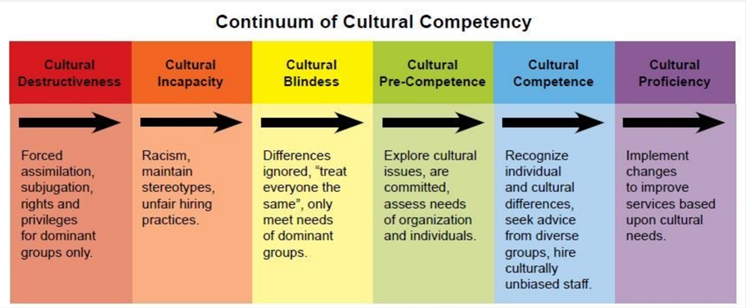Every culture deserves to be loved and respected, anyone can engage in different cultures. However, we must be mindful that “culture is a meaningful part of life, identity, and community, not a hobby or a collectible item” (Wells, 2021). Cultural appreciation is “the genuine understanding, respect and admiration for elements of another culture, an effort to learn about and honor the cultural significance and history of those elements and promote understanding and tolerance among different cultural groups”, in other words, “intent, approach, and impact” (Estaris, 2023). Libraries are places where cultures mix and mingle whether it’s from the patron side or the staff side. All voices and stories matter, so it is important for libraries to provide a safe and engaging environment for all people from diverse cultures and backgrounds, and to provide different learning opportunities on various topics in a way that takes the patron’s culture and norms in consideration. In order to for libraries to be welcoming to all and uphold all stories, staff would greatly benefit from skills like intercultural communication, cultural humility, and cultural competency.

Aspects of Intercultural Communication (Photo by LaurelminWalls, 2022)
Intercultural communication is a great skill to have to make sure you show patrons you appreciate their cultures. Intercultural communication is defined as “the symbolic exchange process whereby individuals from two (or more) different cultural communities attempt to negotiate shared meanings in an interactive situation and in a large sociocultural-macro environment” (Ting-Toomey & Dorjee, 2019). People have differing manners of thinking and seeing the world depending on their background. They may come from a culture that functions in a collective manner rather than individualistic, value silence over speech, or think in a linear way rather than non-linear. These factors and more may affect the way people interact with others and how they handle different situations, meaning there can be much room for error and misinterpretation when communicating with someone from another culture. Library programs and services can be given in different manners that can cover different styles of communication including verbal and non-verbal such as workshops, presentations, trainings, and nonverbal forms such as infographics, brochures, and flyers. These methods will help bridge any gaps between cultural and language barriers staff may face behind the scenes and working real time with patrons. Library staff must keep in mind who their community members are by their communication styles, individualistic or group mindset, challenges marginalized communities face, and implicit and explicit biases one must educate on.

Incorporating diversity and inclusion in the workplace (Photo by Mainsail Partners, 2022)
Cultural humility and cultural competence are indispensable tools to achieve cultural appreciation. Cultural humility is the process of analyzing one’s beliefs and cultural identities to not become limited by one’s views or impose one’s beliefs onto others and be able to openly explore other cultures. One must be mindful, meaning reflecting upon one’s own culture, beliefs, behaviors, and assumptions, and acknowledge the cultural differences between you culture and the other you are trying to appreciate and see things from multiple perspectives (Ting-Toomey & Dorjee, 2019). This will help to create empathy for others and create an environment for open communication to occur. Cultural competence is “cognitive flexibility, tolerance for ambiguity, behavioral flexibility, and cross-cultural empathy” (Ting-Toomey & Dorjee, 2019). This means you are understanding the whole person- how they think, feel, and behave. It is a process that is continuous in one’s life as you’re always going to be self-reflecting on yourself in regards to others. This is true cultural appreciation- admiring a culture and its people by fully accepting and embracing the way it is, respect the sacred, have genuine and sincere intentions, and be an ally by ensuring an equal balance of power in their decisions and voice, having the same level of importance as other cultures, and educating others (Estaris, 2023). Always do your research on the culture you are partaking and ask someone from that culture if they would be willing to help you navigate their customs and practices.

Photo by Fotolia.com
Embracing different cultures and listening to other people’s stories is something everyone should strive for as it will bring about positive change. Change is a goal that we should all be striving for, and we must always challenge ourselves to be better, to break cultural stereotypes, to break the cycle of oppression due to appropriation, and to give a hand to those in need so that we may all appreciate the wonderful cultures and people around us. It is essential for libraries to familiarize themselves with the cultures they encounter, reflect on one’s individual culture, and promote mutual respect and peace for a successful relationship with their community members.
References
Estaris, L. (2023, September 28). Cultural appropriation vs. appreciation. YWCA Spokane. https://ywcaspokane.org/2023-racial-justice-challenge-cultural-appropriation-vs-appreciation/#:~:text=Cultural%20appropriation%20often%20involves%20an,to%20positive%20cross%2Dcultural%20understanding.
Ting-Toomey, S., & Dorjee, T. (2019). Communicating across cultures (Second). The Guilford Press.
Wells, A. (2021, November 1). Appropriation and appreciation: What’s the difference? National Institutes of Health. https://www.edi.nih.gov/blog/communities/appropriation-and-appreciation-whats-difference

Thank you for sharing your cultural competency. It is a treasured gift with similarities and differences that we share with other people. We can share with our mentors and librarians and learn the opportunities to seek harmony in the workplace. America is the melting pot of nations with the richness of diversity in perspective. What a beautiful piece of sharing cultural difference with the world.
I really love your reflection on cultural competency as well as the graphics included to showcase and support your writing and points. It’s easy to be ‘stuck’ in the line of thinking as treating everyone the same or be general with more dominant groups. But instead, to realize there is a progression.